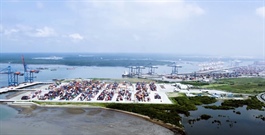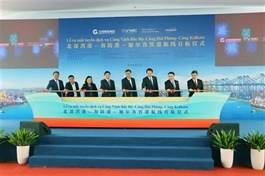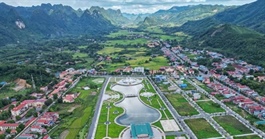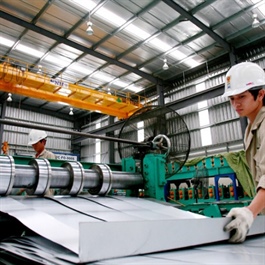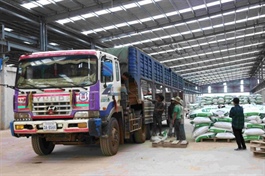Reasonable electricity prices to attract investment in Việt Nam’s energy sector
Reasonable electricity prices to attract investment in Việt Nam’s energy sector
Affordable and competitive electricity rates play a vital role in ensuring consistent revenue streams for private enterprises, encouraging their participation in Việt Nam's domestic energy market.
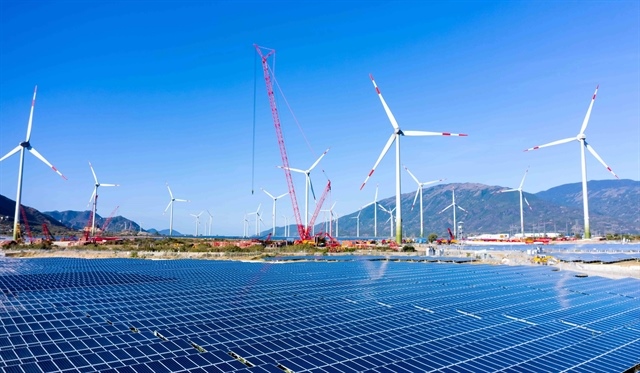
Trung Nam Group's renewable energy complex invested in Thuận Bắc district, Ninh Thuận Province. VNA/VNS Photo |
At a workshop on boosting private sector participation in the country’s energy sector held on February 18, Dr Nguyễn Ngọc Thủy, National Coordinator for the Southeast Asia Energy Transition Partnership (ETP) under the United Nations Office for Project Services (UNOPS), highlighted the need for substantial annual investments in clean energy.
According to Dr Thủy, to meet the growing global energy demand, while still achieving the goals outlined in the Paris Agreement, investment in clean energy for emerging and developing economies must increase threefold from US$770 billion in 2022 to an estimated $2.2-$2.8 trillion annually by 2030.
He pointed out the significant disparity between developed and developing economies regarding energy sector investments. In developing countries, state-owned enterprises and the government contribute 50 per cent of investments, while this figure drops to only 15 per cent in developed nations.
Energy projects require significant capital investments and typically have long payback periods. These projects are highly sensitive to financial variables such as foreign exchange and interest rates and policy or regulatory changes. Therefore, effective collaboration between all stakeholders is crucial to mitigate financial risks and ensure project success.
In Việt Nam, opening the door to private sector participation in energy projects is seen as a way to boost production efficiency, promote sustainability, strengthen national energy security, and support overall economic development.
Deputy Director of the Department of Industrial and Service Economics under the Ministry of Planning and Investment (MPI) Phạm Minh Hùng emphasised the importance of existing mechanisms and policies aimed at fostering private investment in the energy sector. These include Resolution 55-NQ/TW, which outlines Việt Nam's national energy development strategy through 2045, the Electricity Law of 2024, and the Power Plan VIII.
Hùng revealed that by the end of 2024, Việt Nam’s total power capacity is expected to reach 82,400 MW, with the private sector contributing more than 50 per cent. The increasing share of private investment reflects the success of policies like the Electricity Law and other investment attraction efforts.
Hùng reiterated that ensuring reasonable electricity prices that reflect production and business costs is critical for attracting private investment into the energy sector.
He also recommended that the private sector be allowed to determine electricity purchase and sale prices, provided they remain within the framework set by the government. Transparency, fairness and non-discrimination among electricity enterprises are vital elements for fostering investor confidence.
In addition to fair pricing, Hùng emphasised the importance of investment guarantee policies that secure benefits for investors.
Associate Professor Dr Nguyễn Thị Nhung, an expert on the project on encouraging private sector participation in Việt Nam's energy sector, echoed these sentiments, highlighting the need for policy stability and clear pricing frameworks for renewable energy projects to boost investor confidence.
Dr Lê Xuân Nghĩa, an economic expert, recommended that the country encourage private investment across a range of energy sources, including wind, solar, nuclear, coal and gas power.
Việt Nam must also formalise preferential policies for green investments, including tax incentives and reduced fees for renewable energy projects. By offering these incentives, the country can attract more private capital into the renewable energy sector, supporting sustainable development and helping to meet long-term energy goals.
Deputy Director of MPI's Bidding Management Department Vũ Quỳnh Lê said that amendments to the 2024 Law on Investment have provided a legal framework to attract more private investment into energy projects.
To date, 19 Build-Operate-Transfer (BOT) projects in Việt Nam’s energy sector have mobilised nearly $2 trillion in capital, with projects like Phú Mỹ 3 and Phú Mỹ 2.2 thermal power plants already transferred to the state-owned Electricity of Vietnam (EVN).
Citing the Power Plan VIII, Hùng explained that Việt Nam will need an average of $13.5 billion annually for the energy sector from 2021 to 2030, rising to $20-26 billion per year from 2031 to 2050. This capital demand is expected to grow further with the development of nuclear power.
However, Nguyễn Sĩ Dũng, former Deputy Head of the National Assembly Office, pointed to the lack of a competitive and transparent electricity price mechanism in Việt Nam.
He argued that electricity prices currently fail to fully reflect production costs, which diminishes the attractiveness of investment opportunities.
He also said that while raising electricity prices could encourage more investment, it must be accompanied by a well-thought-out communication strategy to avoid public backlash.
Access to capital remains another significant challenge for the private sector, particularly for foreign loans without government guarantees. Smaller private businesses struggle to secure loans, with only large corporations typically able to access such capital.
Additionally, rising land prices due to the 2024 Land Law and cumbersome administration procedures make it increasingly difficult to attract business investment in energy transmission projects, he said.









